|
The
Incredibly Strange Film Show
Episode Guide
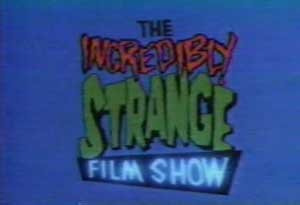 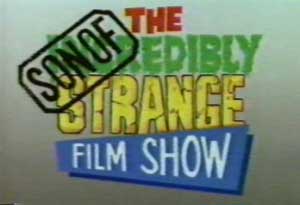
Crew:
Host...Jonathan Ross
Cameraman...Les
Young
Camera Assistant - Ian Wallace
VT Editor..Bob
Ogden
Assitant Editor..Josephine McNally
Dubbing Mixer...Colin
Martin
Production Secrataries... Una Gordon, Debbie
Marrow
Production Accountant...Joanna
Beresford
Production Manager..Sue Hancock
Research...Bernadette
O'Farrell
Titles...Hierographics and Boxer
Productions
Original Music - Steve
Nieve
Sound Recordist...Simon Okin
In a
time when exploitation film had little exposure and was often
relegated to the back aisle of the videostore, The BBC television
series The Inredibly Strange FIlm Show and its sequel Son
of the Incredibly Strange Film Show illuminated these
long-forgotten masters of the drive-in and turned on a whole new
generation to the likes of Doris Wishman and Ray Dennis Steckler. In
addition to covering American film, ISFS also reached out
worldwide and covered the exploding Hong Kong film industry as well
as the Mexican Wrestling movie phenomenon.
Hosted by the acerbic Jonathan Ross, the series was
originally broadcast on Channel Four sometime 1988 and then re-run
on US cable's The Discovery Channel in the early 90's It is from
these Discovery Channel airing which all the details and screenshots
are taken. The chronology of these episodes is unclear to me, so
I've left the list of episodes in alphabetical order. It's also
unclear to me which episodes belong to the original run of
Incrediby Strange Film Show and which ones are a part of Son
of.. Any further information on the shows would be
appreciated.
I
believe the only episode which ever got a real commercial release
was the Ted V. Mikels segment The King of the Castle, maybe
just because Mikels had some rights deal with the show and decided
to put it out himself.
|
Pedro Almaldovar
Little is know
about this segment of ISFS which profiled flamboyant
Spanish director Almaldovar. |
 |
|
Jackie
Chan
Interviewees: Jackie Chan, Willie Chan, Maggie
Cheung
The career of
superstar Jackie Chan is explored thoroughly in this
ISFS, from his early days at the Peking Opera School
all the way to his early feature film role as a Bruce Lee
imitator in The New Fist of Fury and all the way up to
his explosion as a cultural icon in Hong Kong through the
Armor of God and Police Story films. Chan is
seen on the set of his new film The Miracle, setting up
shots and instructing his stunt crew. Also profiled is his
early stabs at American success in Cannonball Run and
The Big Brawl. Numerous clips from his large
filmography is shown, including the famous "outtake" from
Armor of God which shows how Chan got that hole in his
head. The episode ends with coverage of Chan's wild 35th
birthday party. |
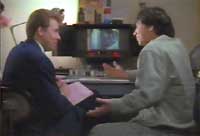
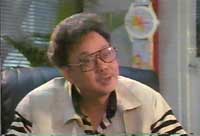
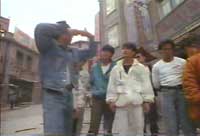
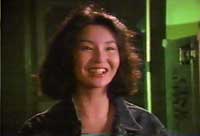
|
|
Tsui
Hark
Interviewees: John Cheung, Tsui Hark,
Tony Rayns, Nanson Shi
Stuart
Gordon
Interviewees: John Carl Beuchler,
Jeffrey Combs,
Stuart Gordon, Brian
Yuzna
This episode of
ISFS profiles both famed Hong Kong Producer/Director
Tsui Hark as well as Re-Animator Director Stuart
Gordon. The Hark segment is more of an overall exploration of
Hong Kong Exploitation in general, with scenes from
Centipede Terror and the Mr. Vampire series
sprinkled about. Most of Hark's career is covered, from his
early controversial Don't Play With Fire all the way up
to his Chinese Ghost Story and concludes with an on-set
visit to A Better Tommorrow Part II. The segment ends
with clips from the climax of Hark's exciting film Peking
Opera Blues.
Stuart Gordon's
segment takes us through Re-Animator, lightly touches
on some of his other Empire projects like Dolls and
From Beyond and ends with a visit to the set of Brian
Yuzna's Bride of Re-Animator. Jeffrey Combs and Yuzna
are intervied on-set about both Re-Animator films and
Special Effects technician John Carl Beuchler also speaks
about his involvment in the films. Strangely enough, Gordon's
interview takes place at the LaBreya tarpits! Gordon seems to
think this is an appropriate setting when talking about the
"survival of the fittest" nature of filmmaking. |
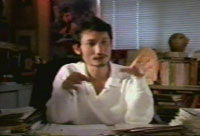
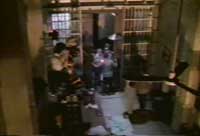
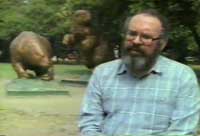
|
|
H.G.
Lewis
Interviewees: David Friedman, Ronny
Kerwin, H.G. Lewis
Drive-In Splatter
pioneer Herschell Gordon Lewis is the spotlight of this
ISFS whose scenes of gore "may be too disturbing even
in their edited form" warns Ross. Lewis is interviewed against
the backdrop of a quiet country club where he enjoys a simple
game of tennis or golf and enjoys his current status as a
direct marketing guru, a position which he holds to this day.
Lewis' beginnings with the Nudie Cuties Lucky Piere and
Boing! are explored as well as the successful series of
Blood pictures which he made with David Friedman. The gory
bits (or at least the ones fit for UK TV) from Blood
Feast, 2000 Maniacs and Color Me Blood Red
are all shown. The show also explores the Lewis solo-projects
like Wizard of Gore and the infamous Gran Guignol Blood
Theater which Lewis ran in the early seventies. A
Haggard-looking Ronny Kerwin also gives the viewer a guided
tour of the Suez Motel, the famous backdrop for much of
Blood Feast. |
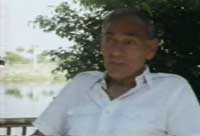
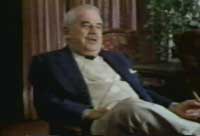

|
|
Russ
Meyer
Little
information could be found about this episode which featured
legendary exploitation filmmaker Russ Meyer. |
 |
|
Ted V.
Mikels
Interviewees: Wendy Altimura, Ted V.
Mikels, Doreen Ross, Tura Satana, Sherri
Vernon
This episodes
begins with on strange sight: director Ted V. Mikels sitting
out in the middle of the open desert and playing an accordian!
Throughout the documentary Mikels is out in the desert either
singing and playing or doing some ventriliquism(?) in order to
get across his bizarre filmmaking philosophy. This particular
ISFS is not as definitive as other episodes and
essentially features a few important Mikels films such as
Astro Zombies and The Doll Squad with no mention
of the beginings of Mikel's filmmaking career.
Mikels liked this
episode so much that he released it on his own video label
under it's own title Ted V. Mikels: The King of the
Castle. |
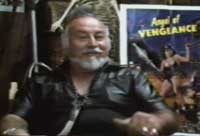
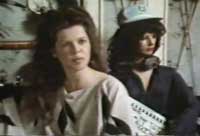
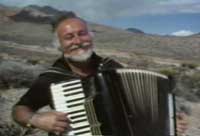
|
|
Sam
Raimi
Interviewees: Bruce Campbell, Scott
Spiegel, Sam Raimi,
Raimi is
interviewed behind a wall of posters for Evil Dead 2 in
this piece which offers a nice retropective of his
pre-Darkman work (Ross casually mentions that Raimi
currently has a few projects in development with Universal).
Numerous clips from his early super-8 shorts are shown in
addition to choice scenes from the super-8 Evil Dead
promo Within The Woods, a film which Raimi presented to
prospective investors as proof of his filmmaking
abilities.
Also included is
a visit to the set of Scott Spiegel's Night Crew
(AKA Intruder) where Sam is seen playing a cameo role
of a doomed butcher.
The production
nightmares of Raimi's big-budget sophmore effort
Crimewave are discussed and the film ends a short
segment on Evil Dead 2 where Raimi seems unsure of
whether Ash will re-appear in another film again.
|
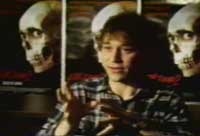
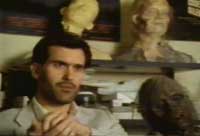
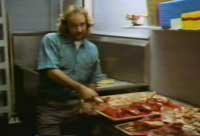
|
|
El Santo
Interviewees: Jaime
Almieda, The Blue Demon, Son of the Blue Demon, Lorena
Velasquez, Johnny Legend, Marlo Guerrero, El Santo, The Son of
El Santo
The Late Mexican
wrestler El Santo is profiled in this episode of ISFS
which explores the general phenomenon of Mexican wrestling
film in general, from El Santo's films to Rene Cardona's
series of female wrestling films which starred Lorena
Velasquez to the other stars of wresting cinema like Blue
Demon. Johnny Legend also pops up and gives his early
experiences with the dubbed late-night viewing of the "Samson"
series.
The show ends
with Legend wandering around Mexico with some guy in an aztec
mummy costume, scouting location's for Legend's proposed epic
Emanuelle Meets the Aztec Mummy.
|
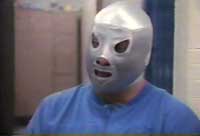
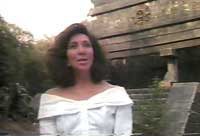
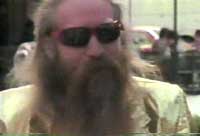
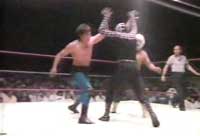
|
|
Fred
Olen Ray
Interviewees: Stephanie
Fitzpatrick, Fred Olen Ray,
Teagan
Doris
Wishman
Interviewees: David
Friedman, Doris Wishman
Direct-to-video
favorite Fred Olen Ray is interviewed on the "set" of his
then-new film Bad Girls from Mars. Fred's career is
thoroughly covered, from Alien Dead and Scalps
all the way up to Hollywood Chainsaw Hookers. The most
embarrasing point of this episode comes when the ISFS
crew corner the Mars script girl and she basically
tells us the entire plot of the film and how it ends! I guess
that's another one we don't need to see.
The interview
with female exploitation pioneer Wishman goes through all her
early success in the nudie cutie all the way to the rougher
style she adopted in the 70's all the way up to the Chesty
Morgan films. Friedman gives his own insight about Wishman's
bizarre film technique (filming the back of people's head to
get around non-sync sound!) as well as his opinion of Wishman
as a shy young woman who was offended by the very pictures
which she produced. Ample time is also given to the runaway
weirdness of The Amazing Transplant as well as
Wishman's genre-bending epic Let Me Die a
Woman! |
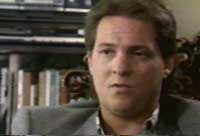
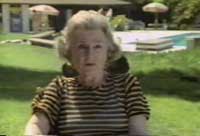
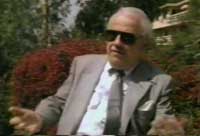
|
|
George
Romero
Interviewees: George Romero, Tom Savini, Lorie
Cardille, others(?)
Night of the
Living Dead Director Romero is the center of this episode
of ISFS which takes us through his early days in
Pittsburgh all the way through Martin and the Dead
trilogy and up to the late eighties. Savini is also
interviewed and even at this early stage seems to be prepping
a remake of NOTLD which he describes as starting in the same
way as the first film but then becoming "wildly" different.
Lorie Cardille, lead actress of Day of the Dead, is
also interviewed and Savini makes Ross up as a zombie. Not the
most exciting or in-depth episode of ISFS but given the
subject matter it still makes for a good
documentary. |
 |
|
Ray Dennis
Steckler
Interviewees: Ray Dennis Steckler, George Morgan,
Johnny Legend, Don Knivling
This Steckler
retropective covers everything from his early days directing
the Arch Hall Jr. film Wild Guitar (cue anecdote about
the overbearing Arch Hall Sr.) all the way up to his current
(in the late eighties) position of making slasfer films in Las
Vegas. Steckler is even seen in the back alley location of one
of these films and give Ross a bit part in the movie! Also
interviewed is Steckler's on-screen persona Cash
Flagg.
|
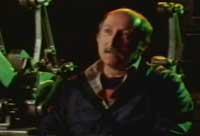
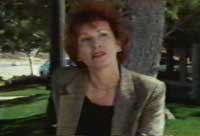
|
|
John
Waters
Interviewees: Glen Milstead (AKA Divine), Mink Stole,
John Waters
Waters here is
captured at the height of his popularity with the mainstream
hit Hairspray and the enterprising attitude of the
ISFS makers shows; indeed, this is probably the most
in-depth and complete episodes of ISFS. All living
members of Waters' Wonderland actors are interviewed,
including what is probably one of Divine's final interviews.
Ross caught Divne at the Hairspray premiere and he seems
overjoyed at all the success.
Most of his
career highlights are touched on, From his early work with
Multiple Maniacs and Female Trouble, Pink
Flamingos (though Waters' attempts at a sequel are
untouched) all the way to the more above-ground spectacles
Polyester and Desperate Living. Waters' also
mentions his brief career of teaching filmmaking in prison,
where he taught the inmates to express their anger in
movies. |
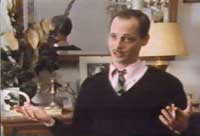
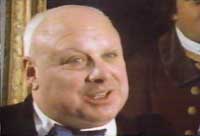

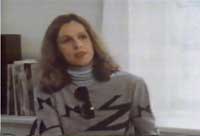
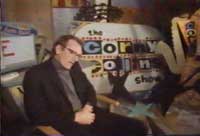
|
|
Ed
Wood
Interviewees: Rudolph Grey, Dolores
Fuller, Valda Hansen, Paul Marco, Harry Medved, Norma
McCarthy, Maila Nurmi (AKA Vampira)
Though many
documentaries have been made about Wood in the time following
ISFS, this is still one of the most extensive and
interesting ones ever made. Most of the Wood's stable of
actors are interviewed as well as his ex-wives Fuller and
McCarthy, both giving sordid accounts of Ed's love of women's
clothing. Most of his milestone movies are featured, from his
early works like Bride of the Monster and Glenn or
Glenda to his masterpiece Plan 9 From Outer Space.
Wood's later work in nudie pictures and pornographic fiction
is lightly touched upon (a few clips from Orgy of the
Dead are shown) and the piece ends with a long (possibly
overlong) look at the Plan 9 Musical
Ed Wood
Biographer Rudolf Grey is interviewed as well as Harry Medved,
one of the first film critics to discover and laugh at Ed's
body of work. |
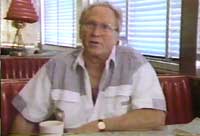
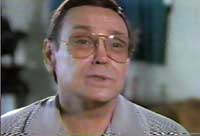
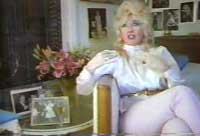
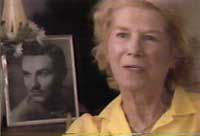
|
Back to
Top
|
